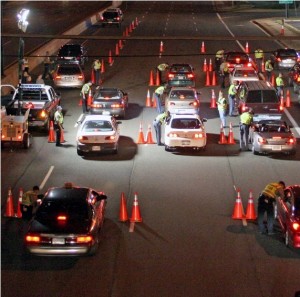What if you put together a big huge party, but no one came? You’d feel pretty lame wouldn’t you??
DUI checkpoints are woefully inefficient. This is a fact. If you don’t believe me read this:
1,021 drivers stopped at Burbank DUI checkpoint; 0 were drunk
A sobriety checkpoint in Burbank on Saturday that screened 1,021 drivers yielded zero arrests, police reported.
Burbank police were stationed at Glenoaks Boulevard just north of Alameda Avenue from 9 p.m. to 2 a.m., during which time six drivers were detained for field sobriety tests, said police Sgt. Darin Ryburn. None were arrested.
Two citations were issued – one for a driving infraction and another for driving without a license.
The Burbank Police Department last year received a $31,500 grant through the California Office of Traffic Safety to conduct sobriety checkpoints through September.
If the purpose of all of this is to keep drunk drivers off the road, then there are clearly better options. Saturation patrols are proven to be much more efficient and cheaper to run than DUI checkpoints. This roadblock is not unusual in the rate of inefficiency. Data shows that they just do not work:
- Every one of the 11 non-roadblock states saw a decline in alcohol-related fatalities, while almost half of roadblock states saw an increase in alcohol-related fatalities.
- Due to this increase, the 39 states (plus the District of Columbia) that do operate roadblocks only accounted for a net 17 fewer alcohol-related fatalities.
Saturation patrols were 32 times more effective at catching drunk drivers than checkpoints!
Data from other states confirm this finding:
| State, Year | Checkpoint Success Rate |
| Arizona, 2007 | .6% |
| Louisiana, 2008 | 1.1% |
| Pennsylvania, 2007 | .66% |
| West Virginia, 2007 | .14% |
| Virginia, 2007 | .33 |
Across the country, roving patrols prove to be more effective. For example, roving patrols in Virginia in 2007 had a success rate of 8.1%, making them 24.5 times more effective than Virginia’s checkpoints.
However, the most important number is not the number of people stopped or arrested, it is the number of dollars received to run these checkpoints. It’s all about politics and money my friends and not about public safety.
It’s time for us to understand that roadblocks are about money and not about safety.
Listen to a radio interview I recently did:
Mcshane Interview on DUI Checkpoints Radio Wlbr 6-5-2013-1 from The McShane Firm on Vimeo.
